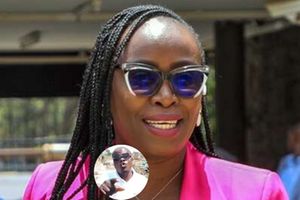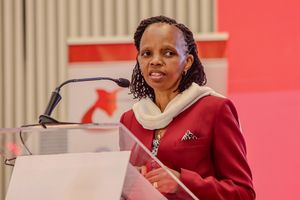Death of activism? Civil society missing in action as Kenya blunders

Locals take to the streets in Mathare during anti-government protests in March.
Where’s civil society when average Kenyans, some 78 per cent of our 50-million-strong population, reel under various injustices, with the debt throttlehold topping the list?
Although civil society led the much-touted 1990s second liberation movement that climaxed in scrapping section 2(A) of the Constitution, things fell apart when Mr Mwai Kibaki became President. Neutering of civil society continued post-Kibaki, eventually gaining the unflattering ‘evil society’ moniker.
Hence, as Kenya burns, civil society is missing in major national debates. Recent weeks have witnessed rival groups of Azimio la Umoja One Kenya Coalition Party and the ruling Kenya Kwanza Alliance destroy private property.
Most notable was the torching of United Democratic Alliance offices in Siaya and destruction of Northlands estate in Ruiru, a property associated with former President Uhuru Kenyatta’s family late March.
While professor and former Makueni Governor Kivutha Kibwana insists that civil society is alive and well, Mr Elkanah Odembo, former National Council of Non-governmental Organisations chairperson and later Kenya’s ambassador to France and the United States, regards civil society to be in a shambles.
However, Prof Kibwana told this writer via WhatsApp: “I don’t believe civil society is dormant. During the BBI debate, civil society rose to the occasion and prevented an opportunistic change of the Constitution.
Although recently Baba (Mr Raila Odinga) called civil society to Ufungamano, the who-is-who of current civil society decided to have their own meeting to interrogate the bi-partisan dialogue by the political class. I’m made to understand civil society is regrouping.”
The Building Bridges Initiative (BBI) was a vehicle Mr Odinga with then President Uhuru Kenyatta’s support, crafted to drive Raila’s fifth quest for the presidency. Like Prof Kibwana, Dr Joyce Nyairo, Research Fellow at Wissenschaftskolleg zu Berlin, is wary of wholesale dismissal of civil society.
“NGOs… come in many shades, some more structured others more like MANGOs (My own NGO) [whose] founders never leave! [The] focus varies — from human rights, social justice, governance, to environment; the arts etc,” she said via WhatsApp.
The scholar-cum-media commentator believes environment, arts and culture and media NGOs have thrived post-Kibaki. “We must not limit our definition of NGOs to governance watchdogs who have continued to devise new ways of engaging government inadequacies and failures.”
Alongside disgruntled politicians and human rights groups, civil society organisations (CSOs), including NGOs, consigned Kanu to irrelevance. A website entry concurs with Dr Nyairo’s description of CSOs as “diverse in purpose, governance structure, size and serve an important function in society. [They include] community-based organisations, village associations, environmental groups, women's rights groups, farmers' associations, faith-based organisations, labour unions, and co-operatives.”
This article veers towards human rights and faith-based groups that led the 1990s ‘revolution’. These, alongside disgruntled politicians, staged protests that ended Kenya’s 23-year single-party rule. Kenya reverted to multiparty democracy, which the independence Constitution envisaged, but which died after Jomo Kenyatta disbanded opposition leader Jaramogi Odinga’s Kenya People’s Union party in 1969, labelling it ‘subversive’.
Future of Kenya Foundation Director Cyprian Nyamwamu, like most sources quoted here, regards 1992-2002 as the heyday of Kenya’s civil society movement. Via email, he quotes Duncan Okello and Celestine Nyamu: “University dons and professionals were compelled by circumstances of being a displaced middle class to fight the authoritarian state. The Alliance offered civil society luminaries the political cover which made the state to fear touching them.”
Mr Nyamwamu’s civil society roll of honour includes Catholic Archbishop Ndingi Mwana a’Nzeki, who has since died, Methodist Bishop Zablon Nthamburi, and Dr Willy Mutunga (Chief Justice 2011-2016). Also listed are politician Jael Mbogo, famed for ‘consigning’ Kibaki to Othaya after he controversially beat her for Bahati constituency MP in 1969. Others are the outspoken Presbyterian Church Minister, Dr Timothy Njoya, former Anglican Archbishop David Gitari, Prof Kibwana, Prof Maria Nzomo, Dr Gibson Kamau Kuria, and Mr Davinder Lamba.
Scholars and CSO luminaries interviewed here agree that, despite their strong faith and hope in the movement’s future, it’s a pale shadow of the 1990s brand, and that when it’s most needed. Prof Kibwana says CSO leaders’ exodus to the Kibaki government weakened the movement. “The migration of civil society leaders to government seriously bled the movement without prior nurturing of the level two and three civil society leaders.”
Dr Nyairo concurs: “27 members of the 90s civil society joined the government,” meaning “depletion of experience.” In a grim pointer to the future impact of demonstrations, she says: “Kibaki’s management of protests, giving protesters police escort, demystified demos [and] made them less visible for their lack of drama… However, the rise of digital media provided new sites and modes for the articulation of protest.” She gives Gado’s Buni Media Ltd and the XYZ Show as examples of satire.
‘Drama’ defines demonstrations, which is probably why Mr Odembo views CSOs’ role amid daunting national challenges as invisible. Where is civil society when debt is choking Kenyans? Why didn’t it arrest the Shakahola horror—a product of brainwashing of desperate poor?
Abject poverty, largely caused by Kenya’s spiralling debt, is an issue NGOs should prioritise. At a time one in every two shillings Kenya Revenue Authority collects goes to service debt, no issue can be more urgent.
Civil society, he asserts, should provide a breakdown of what we owe and to whom. Since the government won’t tell Kenyans, NGOs should engage World Bank and IMF on the crippling debt with a view to renegotiation and restructuring. “Africans don’t like that because it comes with conditions, [which] our corrupt governments don’t want.”
- Ms Kweyu is a consulting editor and contributor to Daily Nation. [email protected]





